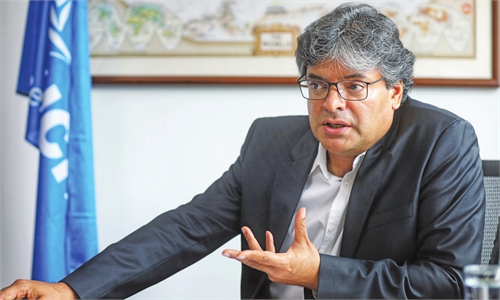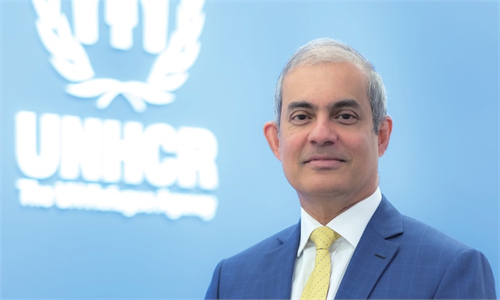UNHCR planning for 4m refugees depends on situation: spokesperson

Matthew Saltmarsh, chief of News and Media Section of the UNHCR headquarters in Geneva Photo: Courtesy of UNHCR Beijing Office
Editor's Note:
The world is witnessing the large-scale conflict between Russia and Ukraine. As the UN reported, hundreds of thousands of refugees have fled Ukraine since the start of the crisis. Cold weather, a lack of basic necessities, the Omicron variant... the refugees have to face severe hurdles during their exodus, particularly at a time when the world is fighting hard against the COVID-19 pandemic. As the most influential and indispensable organization mandated to aid and protect refugees, UNHCR, the United Nations Refugee Agency, plays a significant role on this matter. In an exclusive interview with Global Times (GT) reporter Sun Haoran on Wednesday, Matthew Saltmarsh (Saltmarsh), chief of News and Media Section of the UNHCR headquarters in Geneva, illustrated the refugee issue caused by the expanding war with data, specific measures and operations of the UNHCR, and the commissioner's meticulous plans.
GT: Media said the UN estimated more than 500,000 people have already escaped from Ukraine since the start of the Russia-Ukraine conflict. What is the current number based on your information? How many of them have been properly resettled?
Saltmarsh: At the moment, we believe that around 680,000 people have fled Ukraine to neighboring countries. As well as these refugees, we believe there are hundreds of thousands of internally displaced people inside Ukraine - it is extremely difficult to get precise numbers. In any case, the number of refugees is increasing hour by hour. We are planning for - I stress planning, not forecasting - 4 million refugees, but much will depend on the duration and nature of the conflict.
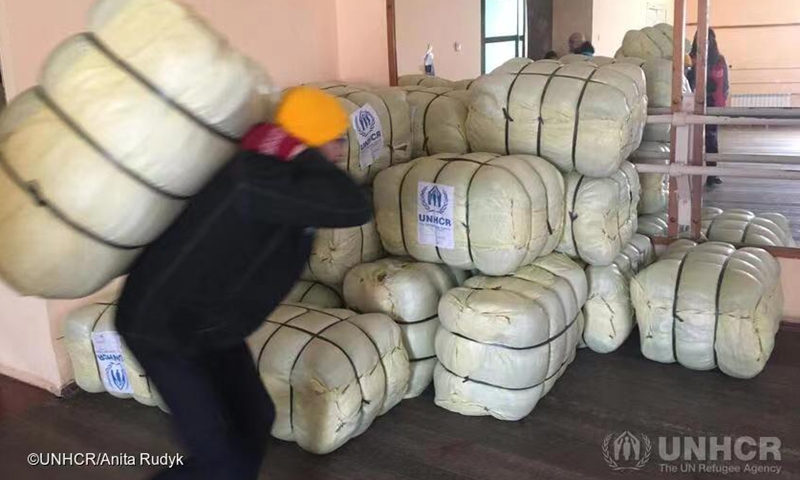
Picture of UNHCR supplies Photo: Courtesy of UNHCR Beijing Office
GT: We know that the UNHCR is not a political organization, but the issues you deal with were mainly caused by politics. What role can the UNHCR play, particularly in this case, to help drag Russia and Ukraine back to the negotiating table and bring peace back to the region?
Saltmarsh: Our role is to provide humanitarian support and protection for people who have been forced to flee their homes, and we do not have a role in political negotiations. We do call on all parties to protect and spare civilians and civilian infrastructure, and to ensure that humanitarian workers are able to deliver aid to those who need it. A failure to do so will compound the already extraordinary levels of human suffering.
GT: How many neighboring countries of Ukraine have opened their borders to accept these refugees? How many refugees have each country received so far?
Saltmarsh: Poland, Hungary, Romania, Moldova and Slovakia have received the largest numbers of refugees so far, and both the authorities in those countries and the civilian population have provided extraordinary levels of support. We also have reports of a sizeable number of refugees crossing into the Russian Federation. We will soon be launching a data portal with breakdowns of the numbers, regularly updated.
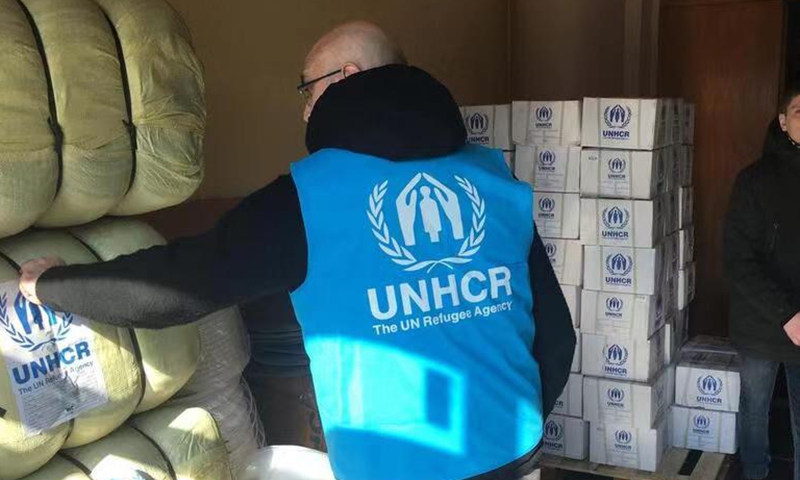
Picture of UNHCR supplies Photo: Courtesy of UNHCR Beijing Office
GT: We all know that some European countries have also faced refugee problems in the past several years. What are the major obstacles these countries are facing in accepting new refugees?
Saltmarsh: The number of refugees fleeing Ukraine is the largest exodus from a European country this century. UNHCR field staff report miles of queues at border crossings, with some people waiting for many hours before they can cross. This is undoubtedly the result of the sheer volume of people fleeing in such a short space of time. For this reason, UNHCR - which has a long-standing presence in the region - is reinforcing operations by urgently sending more resources, staff and relief items. We are also preparing to provide cash assistance to them as needed. That is the immediate focus.
GT: What are the problems the refugees might come across? How does the UNHCR handle these problems?
Saltmarsh: National authorities have responsibility for the registration, reception, accommodation and protection of these refugees, while UNHCR is coordinating the refugee response with other UN agencies and NGO partners for support. Given the freezing temperatures, shelter, blankets, warm clothing and sleeping bags are among the priorities for the most vulnerable, many of them women and children. But we are also helping in areas such as protection and registration, organizing reception capacity, providing emergency relief and cash assistance. We are also providing new arrivals with information on asylum procedures, and working with various partners, are offering legal advice and psychological support. And we have set up online help pages for refugees to get advice and guidance in the country of reception.
We should stress that we have seen tremendous solidarity and hospitality from the countries receiving refugees, including from the authorities and local communities. Many ordinary civilians have provided shelter - including in their own homes - transport, food, hygiene items and other forms of support.
Today, the UN and humanitarian partners launched coordinated emergency appeals for a combined $1.7 billion to urgently deliver humanitarian support to people in Ukraine and refugees in neighboring countries.
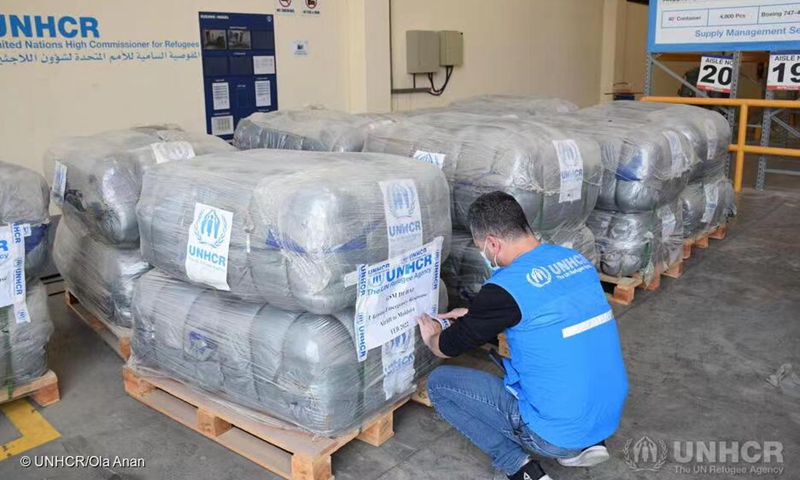
Picture of UNHCR supplies Photo: Courtesy of UNHCR Beijing Office
GT: Since the Omicron variant is still rampaging around the world, what kind of supplies have you prepared to protect the refugees from the pandemic?
Saltmarsh: UNHCR calls on every country to ensure that everyone on its territory regardless of legal status - including refugees, migrants, internally displaced people, asylum-seekers, and others on the move - has access to COVID-19 vaccines, tests, and treatment for COVID-19. We stand ready to support states to overcome some of these barriers - for example, by creating information materials in refugee languages suitable for low literacy levels. PPE will be part of the humanitarian response.
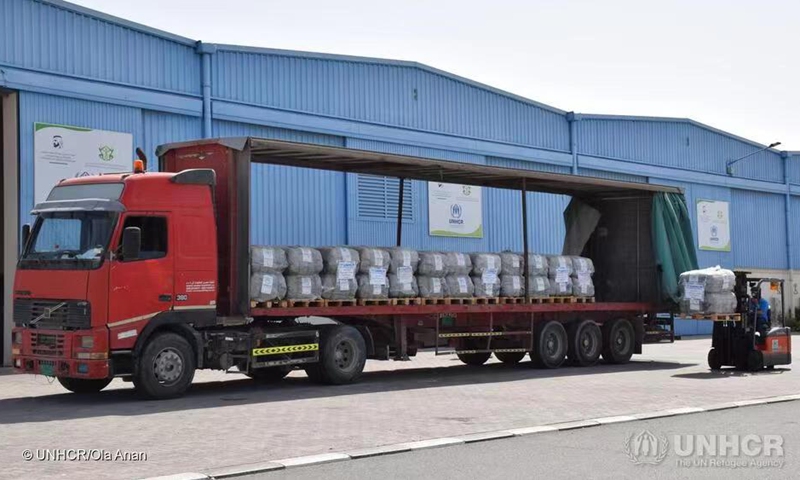
Picture of UNHCR supplies Photo: Courtesy of UNHCR Beijing Office
GT: The refugees are diverse with different ethnic, cultural and political backgrounds. What will the UNHCR do to make sure they will be treated impartially?
Saltmarsh: UNHCR urges governments to continue to maintain access to territory for all those fleeing: Ukrainians, and third-country nationals living in Ukraine, who are now forced to escape the violence. We stress that there must be no discrimination against any person or group. We are aware of challenges faced by some the third-country nationals seeking to enter countries neighboring Ukraine and are in touch with the authorities to ensure that all those in need of international protection have access to the relevant procedures.
